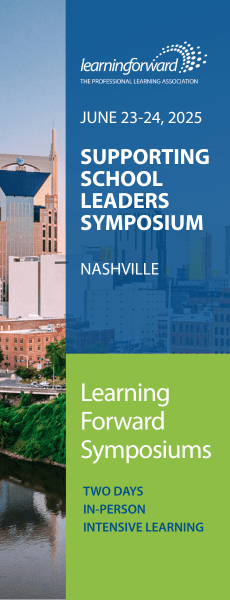There’s an awful video making the rounds right now of a roomful of educators in a professional development workshop. It’s the classic horror show, at least from what we can see of it — a presenter speaking at rows of adults, asking them to recite sentences and phrases back to her. There’s nothing that indicates anyone, presenter included, is engaged or reflective or even learning — except the person who took the initiative to record, presumably surreptitiously, this portion of the workshop. Admittedly, this moment in time is taken entirely out of context.
At its best, the clip is a glaring example of how not to build effective professional learning. Unfortunately, it also stands out as a potential weapon for those stakeholders eager to contend professional learning is worthless. In reality, such workshops persist because, for a variety of reasons, they are easy for systems to offer.
The theme on the cover of this issue of JSD — the shifting landscape of adult learning — invites us to address how learning for educators must transform in these times. The shifts go much further than moving away from the scene in the video mentioned above. However, the fact that such professional learning environments still endure suggests that we still have much to do in moving the field.
Today’s shifts that influence adult learning come from many directions. And in the end, they still require the same fundamentals to be effective.
With technology, new tools, apps, and ways to communicate are proliferating continually. The tools created specifically for education offer more options to gather and create instructional resources, customize learning, and integrate information across systems. Social media allows educators to connect with one another in new ways, spawning Twitter chats — by now an “old” tool.
New standards for students shift some of the content educators teach and how they teach it. It isn’t only career- and college-ready standards that influence how and what we expect students — and, in turn, adults — to learn, though in part they encompass much of what we envision for 21st-century learners.
Evolving student demographics also influence what and how educators need to learn, including a growing recognition of the critical need to build the capacity of educators in high-poverty systems.
These aren’t the only factors at work in schools that require shifts in learning practices. Regardless of the influences, the fundamentals remain. Adult learning must be shaped and driven by:
The data about where students struggle.
The goals educators set for themselves based on student learning needs.
The need to engage all adult learners at whatever stage of career they are or level of knowledge and skills they have.
The alignment of learning designs to the learning goals and needs of adult learners in the room.
The requirement for all learners to have opportunities for active engagement, which is tied to deep understanding and knowledge.
When school systems create connections between all of the exciting shifts in education to shifts in adult learning and cover the fundamentals of effective learning for educators, that’s when they’ll see results. Sadly, it won’t be as easy as hiring a consultant to drone on in the front of the room. However, the size of the task doesn’t take away the obligation school systems have to every learner they serve.
Learning Forward is the only professional association devoted exclusively to those who work in educator professional development. We help our members plan, implement, and measure high-quality professional learning so they can achieve success with their systems, schools, and students.
Categories: Learning designs
Recent Issues
LEARNING DESIGNS
February 2025
How we learn influences what we learn. This issue shares essential...
BUILDING BRIDGES
December 2024
Students benefit when educators bridge the continuum of professional...
CURRICULUM-BASED PROFESSIONAL LEARNING
October 2024
High-quality curriculum requires skilled educators to put it into...
LEARNING TO PIVOT
August 2024
Sometimes new information and situations call for major change. This issue...










